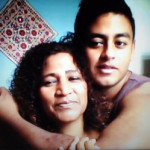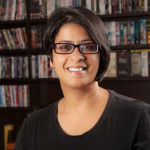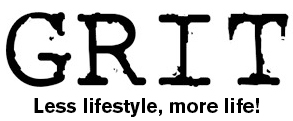
Editor
This month we are very grateful to everyone who has shared their personal stories and medical knowledge on important health-related subjects. This topic resonated with many of you and we were inundated with articles ranging from advice on managing migraines and oral health to raising awareness of difficult subjects such as mental health disorders, diabetes and multiple sclerosis.
Next month we’d like to dedicate our December issue to our Women Empowered or ‘WE’ community. Has WE made a difference to or touched your life? Have you been inspired by a particular speaker? Have you made new business contacts or friendships? Have you put pen to paper and contributed to GRIT? Please send us your WE & Me story (400-700 words) to grit@womenempowered.co.uk before 20th November, 2015.
We look forward to hearing from you.
Sunita Behl, Editor.

Saagar is 20 years old. He is a handsome young man with great potential. He loves to laugh and to make everyone laugh around him. He likes to cook for his friends (his food is quite spicy but he likes it that way). He is an accomplished linguist, cricketer, percussionist and actor. Most of all, he has time for everyone. He listens. He is kind and sensitive. He is my son.
Last summer Saagar was diagnosed with Bipolar Disorder. His illness was confusing and painful for us and most of all for him. He did everything he could to get better but in the end he lost. He ended his life on the 16th of October 2014. He didn’t make it to his 21st birthday.
Somewhere in the world this silent epidemic of suicide claims one life every 40 seconds.
Here are the facts and figures for 2013 in the UK:
- There were 6,233 suicides of people aged over 15 (a 4% increase from 2012)
- The male suicide rate was more than three times higher than the female rate
- The highest UK suicide rate group in 2013 were men aged 45 to 59
So, every day in the UK 15-17 people are lost to suicide. This is more than those lost in road traffic accidents yet ‘Suicide Prevention’ is low down the list of priorities on the public health agenda and the Core Medical Curriculum. The government allocates only 13 % of the NHS budget to mental illness although 25% of patients visiting a GP have a condition that has a direct or indirect bearing on their mind. In addition some GPs have had no dedicated training in Psychiatry and accessing specialist Psychiatric services is getting more difficult than ever before.
The social stigma attached with the issues of suicide and mental illness stops many patients and families being able to speak about it openly, ask for help and be properly informed.
Support and education for carers is very limited yet patients are primarily cared for in the community due to limited NHS resources. Most suicide prevention work is being done by voluntary organisations such as Samaritans, CALM, MIND and Papyrus.
I believe that we all need to recognise the problem of suicide as a ‘Silent Epidemic’. It is our problem and can land unexpectedly on anyone’s doorstep at any time. We need to educate ourselves, reach out and support each other, and demand better care from our medical services and our government.
For any lasting impact we need to change our attitude, as individuals and society, and learn to talk about mental illness and suicide openly and without shame.
Sangeeta has written a blog ‘Kids are Gifts’ where she shares the devastation in the aftermath of the suicide of a loved one. It explores issues around mental health and its main aim is Suicide Prevention. It is available at www.kidsaregifts.wordpress.com

“I give you a maximum of three years to live if you continue with your current lifestyle.” These were the painful words I heard from my doctor exactly three years ago.
I had been diagnosed with Type 2 diabetes, hypertension, severe liver and kidney problems and had a huge stone in my gall bladder. I was only 42 years old. I had been writing my own death sentence every day, with every poor health choice that I made. And I had no one to blame but myself. From being a healthy slim woman, I had allowed the indulgences of life to take over and my poor lifestyle had nearly cost me my life. This was my warning.
Some of my family members had already lost limbs and kidneys to diabetes and others had even lost their life. So with a vengeance, I started to educate myself about this dreadful disease. I honestly believed diabetes was an old person’s disease; something that just happened to all of us as we age, like getting grey hair. I was clearly misinformed.
My condition had left me feeling emotionally drained, physically stuffed and mentally incapable of making even simple decisions. So I re-tuned my thinking and began the uphill struggle and battle to get my health back.
First I cleaned up my pantry (no more butter, ghee, biscuits, chocolates or crisps!) All of these snacks had become a part of my everyday life. Also no more ice creams, white bread, Chinese take-aways or fast food! I had not realised how much dysfunction alcohol had added to my life in the form of my weight gain, poor health and poor decision making. Giving up alcohol was really tough as socialising and drinking went hand in hand for me. In fact giving up all these wonderful joys of life was tough.
Some days are still a battle so I always need to remind myself why I made these choices. I travel a lot for work which means hotels, airports, limited food choices and inactivity. However now, no matter where I am in the world, I make an effort to stay active and exercise. I do not make excuses any more and even choose my hotel based on their gym facilities. And I walk, walk, walk!
In February this year to celebrate reaching my 45th birthday, the year that my Doctor told me I may not see, I did my first half marathon. I have also paraglided into beautiful dolomites of Northern Italy, undertaken two 15k London bridges walks and numerous other 15-20k walks. If all continues to go well on my 46th birthday in February 2016, I am planning to do something really out of my comfort zone!
Apart from losing over four stone, I lost many other things too. I lost all my illnesses and my diabetes is now under remission. I now represent Diabetes UK as their Asian Ambassador to encourage people to re-tune their thinking and get their life in order before it’s too late. Earlier this year, I co-founded an online programme called ‘Use it 2 Lose it’ to encourage women to use their mind, body and soul to re-define their lifestyles and make the right choices.
However last month, I was given another reminder of why taking care of our health is a continuous cycle that needs to be a lifestyle change, not just a temporary fad. During one of my recent overseas trips, I had an angina-related attack. This shocked me, as I now live a very healthy lifestyle, but it also opened my eyes to the fact that we cannot treat our bodies poorly and then expect it to get healthy overnight. Our past will catch up.
I have now been given a second chance twice. Not many are as fortunate. However, as a Mother I am also responsible for the health of my family, so I now choose to share my knowledge with those who are willing to listen and commit to a healthier life.
Wishing you a life full of healthy choices. Use it 2 Lose it.

Everywhere you turn someone ‘claims’ to have Obsessive Compulsive Disorder or OCD. It has become part of everyday speech and increasingly trivialised. However, it is a complex and serious mental health condition. I’ve had OCD ever since I was a child and believe me, anyone with severe OCD would never say that they “loved to have it” or that it has somehow made their life better.
According to OCD UK, the illness affects around 12 in every 1,000 people and can affect anyone, from young children to adults, regardless of gender, cultural or social background. The World Health Organisation ranks OCD within the top ten most disabling illnesses in the world, based on diminished quality of life and loss of earnings.
OCD can be split into two parts: obsessions (obtrusive, unwanted, repetitive thoughts that result in unreasonable fears) and compulsions (acts or rituals carried out because of fears created by obsessions).
When I was a child I didn’t understand I had the condition. I just knew I felt better after doing things in a certain order or making sure that everything was clean. However, over the years my condition became significantly worse. Today I am in my late-30s and every day is a constant battle against the OCD monster in my mind.
A small part of my OCD is repetitive behaviour. I have daily rituals. For example, before I go to bed I have to turn on my bedside lamp, switch off the main light and tap it three times, get into bed, turn my phone on to silent, set my alarm for the next day and then switch off my bedside light. If I don’t do it in that order, I have to start all over again until I do it “correctly.” If I don’t, I become paralysed with fear that something bad will happen to me or my family.
The main way my OCD manifests itself is fear of contamination. I wash my hands repeatedly throughout the day (which are now a permanent shade of scarlet.) I constantly use alcohol sanitiser gel when I’m out and if I shake someone’s hand I won’t touch anything else until I’m able to wash my hands again. I avoid touching door handles, and use my sleeved elbow or tissues instead. Public toilets are a nightmare. If I’m out, I will go the whole day without drinking in an attempt to avoid having to use them (despite knowing it is bad for me.) I can’t remember the last time I was able to use public transport.
Winter is my worst season. With all those germs flying around it takes all my effort to just step out of the house. Some winters, when my OCD has been really bad, I have not left the house for weeks, preferring the safety of my little bubble at home.
Having people visit is difficult which makes it hard for the rest of my family. Physical relationships are difficult. Meeting new people is difficult. Being in a work environment is difficult. I turn down invitations, make excuses to cancel appointments, and ALWAYS shower when I come home, no matter how late it is or how tired I am. Imagine being in a constant state of high alert all day, every day. That’s what living with OCD can be like. I see germs and potential contamination everywhere. It’s mental torture and it is exhausting.
I’ve only briefly touched on a few ways OCD affects me day-to-day. I’ve tried different types of therapy and some have helped. Believe it or not, things are actually better now than they were before. However, OCD never really goes away. You just learn to manage it. In my experience, anything can upset the balance between being able to cope and falling back into the deep hole which I call my OCD nightmare.
If you would like to find out more about the condition there is great information available on various mental health websites. Most of all though, next time you catch yourself saying “I’m OCD” stop and think about whether you actually are.

At some time in our life we have all had to face a health issue or care for someone with a particular health condition. Through both my personal and professional experience I have found that irrespective of who you are, where you live or what you do for a living ‘health’ is the one area that we all feel vulnerable in and that unites all of us under the same umbrella of vulnerability.
For me, health reminds me of my mortality and that no matter how hard we try to stay healthy this is the one thing that we may not have full control over. As a healthcare professional this is quite difficult for me to turn away from so I would like to share two separate viewpoints; one personal and one professional.
In my family life I cared for an unwell and dying parent. I watched a pillar of steel reduced to almost nothing in a very short space of time. My father was a strong athlete. He had never needed to visit a hospital, had a successful career and was a loving family man. I saw him as immortal but even he succumbed to a higher power that we are truly ignorant of. This experience changed my perspective on life, health and mortality. I saw the strain that this had, not only on my father, but on our whole family who cared for him day and night.
It wasn’t just about the illness. After some time it became about the situation, the mood of my father and the family, and the spirit that lay within. I have never seen a man fight so much for his life – he had no reason to go and he didn’t want to. However, at some point we are all made to surrender. After 9 months in hospital we were exhausted, drained and losing the will to live, but my father never did. It was then that my understanding deepened about how health isn’t just a physical entity. Health encompasses our entire being; mind, body and soul. Unless you look after all three how can you really say you are ‘healthy’? And if you don’t take care of your own ‘health’, how do you take care of someone else?
I was in a unique positon as a doctor, however even those skills weren’t enough. I often had to leave my doctor hat at the door of the hospital so I could just be a daughter. I had to trust and work with the healthcare system in a professional manner. This life changing event not only made me more aware of mortality but also that taking care of your health isn’t just about diet and exercise (although these are equally important). It is also about taking care of the spirit and soul within.
In my professional life I have seen and witnessed ill-health and death numerous times but obviously none are as impactful as a personal loss. On a regular basis I witness health from the angle of a professional while taking care of patients and dealing with healthcare services. I also see the strain it can cause. Those who take responsibility for their heath often do better than those who take it for granted. Some still continue to smoke and eat a high fat diet, despite having a third blocked artery.
However, whatever their health condition most patients seem to have a smile on their face…..perhaps a sign of the human spirit. It is here that you see that no matter where you are from, health is universal. Whatever shortcoming patients experience in their health their individual perspective makes all the difference. Simply put, having a positive outlook will often make all the difference. Through my patients I have seen that caring for the mind and soul can provide the determination and spirit required to overcome any illness, or even keep you on a healthy path. So be happy and be healthy!

Jamie Oliver is a brave man. From tackling the challenge of transforming school dinners into nutritious, healthy meals (Jamie’s School Dinners) to his current battle against the sugar industry (Jamie’s Sugar Rush), he is taking on one of the biggest public health challenges of our time – the national childhood obesity crisis.
As a parent myself, and the founder of WellVine (a children’s healthcare service), the issue of childhood obesity is of particular interest to me. One statistic that screams out from the research is: ‘Parents rarely recognise their own child as obese.’ Parents are also more likely to underestimate a child’s weight in families from a black or South Asian heritage, if they are from a deprived background and if their child is a boy or older.1
I can understand this. At an instinctive level we all feel a fierce, parental protectiveness towards our children. Who would want to call their own child obese? Of course, all of our children are not on the path to obesity and the majority of us do try to do our best. I may not be a ‘Pinterest Mum’ making fancy sandwich trains, and fishcakes with bunny ears, but , like most other parents, I do spend an inordinate amount of time planning and prepping child-friendly meals (while my husband and I often resign to eating leftovers!) However if we all took a long, hard look at our own family’s eating habits, I think we may be surprised at some discoveries we make. For instance, I recently found out that many of the food items I was providing to my baby as ‘snacks’, were actually packed with that new evil – sugar!
The term ‘obesity’ covers a spectrum from overweight to moderately obese to obese, defined by BMI calculations, but they all come with significant and escalating health risks.2 It is a frightening epidemic that is much more common than we think, with over a fifth of 4-5 year olds and a third of 10-11 year olds in England deemed to be overweight or obese.3
But why should we care about child obesity? Well, for starters, we are setting up our children for a lifetime of health risks associated with serious conditions such as type 2 diabetes, coronary heart disease, and strokes to name a few. In addition, it is established that obesity can also have a psychological impact on a child’s self-esteem. Although there has been some evidence in recent years to suggest a levelling off in the rapid rise in childhood obesity, we need more action rather than complacency on this silent danger. We all need to buy into the simple concept of health – for us and for our little ones.
At WellVine we care deeply about how we can improve care for children, and how we can better support parents when it comes to their children’s health. We believe strongly in the idea of preventative care – helping children and adults live happier, healthier lives. Fostering healthier habits to tackle childhood obesity is an area we feel passionate about. We regularly produce ‘Q&A with our professionals’ based on common queries that parents have child health issues and will be producing a ‘Q&A’ guide on children’s nutrition shortly.
WellVine is a convenient way for parents to connect with experienced and vetted child health professionals via online video calls – anytime, anywhere. Sign up to our newsletter at www.wellvine.co.uk to be updated on the latest guidance and advice from our child health professionals.
References: 1. British Journal of General Practice. 2. NHS Choices. 3. Public Health England.

Oral health is much more important than just an attractive smile. In fact, poor oral health and untreated oral diseases can significantly impact your quality of life. In many cases, the condition of our mouth mirrors the condition of our body as a whole. More than 90 % of all diseases which affect our body produce oral signs and symptoms 1 and recent reports have shown a relationship between periodontal (gum) disease and stroke, heart disease and even preterm low-birth-weight babies.2 This means that your dentist may be the first healthcare professional to diagnose a health problem.
The connection between oral health and overall health
Like many areas of the body, your mouth is teeming with bacteria. Most of these are harmless and normally your body’s natural defences and good oral health care, such as daily brushing and flossing, help keep them under control. However, without proper oral hygiene, bacteria can reach levels that might lead to oral infections, such as tooth decay and gum disease.
In addition, some medicines including decongestants, antihistamines, painkillers and diuretics reduce saliva flow. Saliva washes away food and neutralizes acids produced by bacteria in the mouth. This helps to protect you from bacteria that might lead to disease.
In my opinion educating patients on the link between oral and overall health, including warning signs in the mouth that may indicate a larger health problem, can help save lives. Your mouth is a window into what’s going on in the rest of your body, so it can be very useful for detecting the early signs and symptoms of a disease.
Conditions which cause oral signs and symptoms
Endocarditis is an infection of the inner lining of your heart (endocardium). This usually occurs when bacteria from another part of your body, such as your mouth, spreads through your bloodstream and attaches to damaged areas in your heart.
Heart disease will claim more than half a million lives this year. Some research suggests that people with gum disease may be at a higher risk of having a heart attack. In fact gum disease may even be a more serious risk factor than high blood pressure, smoking, high cholesterol, gender or age.3
Pregnancy and birth Research estimates that as many as 18% of preterm, low birth weight babies born in the United States each year may be attributed to oral infections.3 The theory is that oral bacteria release toxins, which reach the placenta through the mother’s bloodstream which interferes with growth. Oral infections can also cause the mother to produce labour-triggering substances too quickly, potentially triggering premature labour and birth.4
Diabetes reduces the body’s resistance to infection putting the gums at risk. Gum disease appears to be more frequent and severe among people who have diabetes. Research shows that people who have gum disease have a harder time controlling their blood sugar levels. Patients with diabetes who do not have good blood sugar control tend to have more oral health problems.5
HIV/AIDS – Oral problems, such as painful mucosal lesions, are common in people who have HIV/AIDS and are often the first sign of the condition. In addition HIV/AIDS can lower the body’s resistance to infection, making oral health problems more severe.6
Osteoporosis causes bones to become weak and brittle and might be linked with periodontal bone loss and tooth loss. 7
How can I protect my oral health?
To protect your oral health, practice good oral hygiene every day. For example:
• Brush your teeth at least twice a day with fluoridated toothpaste.
• Floss daily to remove plaque from places your toothbrush can’t reach.
• Eat a healthy diet and limit between-meal snacks.
• Replace your toothbrush every three to four months or sooner if bristles are frayed.
• Schedule regular dental check-ups.
Always contact your dentist as soon as an oral health problem arises. Remember, taking care of your oral health is an investment in your overall health.
References: 1. Academy of General Dentistry. 2. The Link between Oral health and Systemic Health – Dentistry Today. 3. The National Institute of Dental and Craniofacial Research. 4. Journal of Periodontology, American Academy of Periodontology 1996. 6. British Dental Health Foundation; Diabetes Research and Clinical Practice 2000. 7. The World Oral Health Report 2003, World Health Organisation 8. Systemic Osteoporosis and Oral Bone Loss, American Dental Association

Migraines are a debilitating form of recurrent headaches, affecting 8 million people in the UK, including myself. Women are three times more likely to suffer from them than men. This article will help you to diagnose migraines and provide advice on how to manage them.
The pain of a migraine is classically one-sided and often throbbing (pulse-like) in nature and associated with aversion to bright lights and loud sounds and can result in nausea and vomiting. Women can notice that migraines are especially bad at the time of their menstrual cycle, as a result of their hormones playing havoc.
If migraines attacks are infrequent (less than 5 attacks per month), then these can be managed in the first instance with some simple measures:
1. Drink more water
Increase hydration with water to 2-3L per day (most of us drink a small fraction of this daily recommended amount)
2. Cut out caffeine
Reduce or completely eradicate caffeine intake (e.g. coffee, tea, fizzy drinks and energy drinks)
3. Check your sleep pattern
Adopt a regular sleep-wake cycle and try to sleep for 7-8 hours a night. Sleep-deprivation is a common trigger and erratic sleeping patterns (e.g. shift-work) can really exacerbate the problem
4. Eat regularly
It is important not to skip meals and eat regularly.
5. Keep a food diary
Try to identify any food triggers (common ones include chocolate, cheese and red wine).
6. Do not over-use pain-killers
Painkillers for migraines should not be taken more than two days a week. Migraine sufferers taking regular pain-killers, in particular opiates (codeine-based medications), are likely to develop medication-over-use headaches and get into a vicious cycle, making the headaches very difficult to treat.
During an attack, high dose ibuprofen or aspirin (check with your doctor first) are effective as a first-line treatment and should be taken as soon as the attack starts, in conjunction with an anti-sickness mediation if you suffer from nausea. However, if these prove to be ineffective then prescribed medications, such as triptans, can be useful.
Alternatively, if the migraines are occurring on more than five days per month and are very intrusive, then we recommend starting a preventative medication, which rather than a pain-killer, prevents the migraine from occurring in the first place. These have to be taken daily to be effective and your doctor will be able to discuss the different options that are available.

Do Asians get multiple sclerosis? Back in the day, many people answering that question would have said “no.” The truth is that yes we do. And in the UK, MS is becoming much more prevalent among those of us who have been born and brought up in this country. Despite this, it is a condition that is surrounded by myths and lack of knowledge. Many Asians with the condition can face prejudice, stereotyping and stigmatisation. That’s why I try so hard to raise awareness, educate and support.
Multiple sclerosis, or MS as it is more commonly known, is an autoimmune neurological condition in which the body’s immune system becomes faulty and starts to attack healthy tissue in the brain and spinal cord. Imagine an electrical wire where the plastic casing has been eroded and the damaged wire is exposed. Electricity cannot flow properly and consequently your iron, or vacuum cleaner or mobile phone charger only works intermittently. In people with MS, that’s what is happening to our nerves, which means that our bodies cannot function properly.
As a disease of the central nervous system, MS affects the very core of someone’s being. Depending on where damage is occurring, symptoms can range from mobility issues, muscle spasms, pain, bladder/bowel problems, cognitive issues, sensory problems (e.g. numbness, burning or tingling) and speech/swallowing difficulties, to name but a few.
I was diagnosed with the most common form of MS, the relapsing remitting type, in 2008 when I was 28. MS affects three times as many women as it does men and majority of people who are diagnosed are between the ages of 20 and 40 years old. It’s not an “old person’s” illness, as many believe. It very much hits people when they’re in the prime of their life.
There are four different types of MS:
1) Relapsing Remitting (characterised by relapses and then periods of full or partial recovery)
2) Secondary Progressive (characterised by gradual disease progression and worsening disability, with no periods of recovery; most people who have relapsing remitting MS will go on to develop secondary progressive)
3) Primary Progressive (the least common form, which is characterised by continued disease progression and disability from the outset)
4) Benign (Few or no relapses for more than 15-20 years)
Currently there is no cure. There are drugs that help people to manage symptoms and drugs that can potentially delay progression, depending on the type of MS you have.
Living with MS can be hard. It often affects not just the person but also the people around them. It can have a profound effect on family, friends and work life.
However, with the correct support and good healthcare teams, it is still possible to lead a full and positive life. However we need more people in the public eye who are willing to talk about living with MS. In the US, people like Montel Williams, Jack Osbourne, Alan and David Osmond, and Richard Pryor have helped to put MS in the spotlight. In the UK we’re getting there and the major MS charities are always working on raising the profile of the condition. Radio 1 DJ Scott Mills and JLS band member Oritse Williams, whose Mums both have MS, are working to help raise awareness. However, to really understand about MS, you need to ask questions. So, if you know someone with the condition, talk to them and ask how they’re feeling and how their MS affects them!
For more information about MS visit: www.mssociety.org.uk or www.mstrust.org.uk
Trishna on Twitter: @TrishnaBharadia
Trishna on Facebook: www.facebook.com/trishnabharadia2015

Does your mind, body, and soul not have the vibrancy that you believe it should? Do you feel that you lack energy? Daily life can be stressful and you may feel powerless. Our society, institutions and even some religions can offer messages of powerlessness that we accept. However, if we feel helpless over our life circumstances, we suffer.
The reality is you have infinite power, but the power is hidden inside you. Most people fail to discover this and my job is to bring out the power within. Our body identifies and efficiently eliminates toxins and germs on a daily basis. Our conscious and subconscious mind has the ability to effectively process, analyze and utilize the vast amount of information we are surrounded with and work on healing our mind, body and spirit.
The mind can constantly adapt, learn and expand beyond perceived limitations. Our higher consciousness or spirit represents the core of our being, our true essence and goes beyond the thoughts and emotions. It provides us with enormous resources of wisdom, strength, compassion and peace.
The connection of mind, body and spirit represent a perfect healing system, equipped with infinite possibilities to respond to even the most adverse situations. However, most people don’t know how to access and utilize this innate potential. We all know that we need to eat five fruits a day for healthy living and well-being and the same principle applies for healthy ‘mental’ living.
Here are five ‘Mind’ fruits a day to help you to create a healthy ‘Mind Diet to enlighten your path to success:
1st Fruit – Have an Attitude of Gratitude – First, we need to ensure that we thankful for everything we have in our lives. Be grateful that you are blessed with resources in your life.
2nd Fruit – Embrace Change – Acceptance of change leads to no past regrets and helps you to welcome your bright future. Each day accept a small change with a smile on your face.
3rd Fruit – Positive Thoughts – Do a mental exercise of turning any thought in your head from negative to positive. Because if you think positive only 51% of time then you will enjoy positivity in your life.
4th Fruit – Visualization – This is visualizing your future and manifesting you have already achieved your desired goal or anything that you feel passionate about. Then take one step each day to achieve that goal.
5th Fruit – Enjoyment – Don’t forget to live in the present. We should live each day like it’s our last and make the most of it by enjoying your life to the fullest and spending time with loved ones.
Rachanaa conducts workshops in the UK, India and online on Reiki, Oracle Card Reading, Numerology, Healing Mind, Body & Spirit and Feng shui. She strongly believes in karma and says that “The key to living is giving”. She supports projects in India which help address poverty, women empowerment, disability and orphanages. 5% of the proceeds of her book ‘Awake Your Dreams: Stop Procrastinating ! Start Achieving !’ will be donated a charity called Give India. For more information please visit www.rachanaajain.com

One in three people in the UK will be touched by hospice care at some point in their lives and every year hospices support around 360,000 people – 120,000 patients and 240,000 family members.
Since opening in 2003 Haven House Children’s Hospice has supported more than 600 families, providing high quality palliative and holistic care for babies, children and young people who have life-limiting or life-threatening conditions across North and North East London, West Essex and East Hertfordshire. Providing this care would not have been possible without the generous support of our local communities. Each year it costs £3.6 million to fully resource Haven House. The majority of our income comes from voluntary donations whereby individuals and groups raise funds through exciting and inspiring ways.
Hospices draw strength from the communities they serve and by collaborating with other hospices, particularly those involved in Children’s Hospices across London (CHaL), Great Ormond Street Hospital, Clinical Commissioning Groups, local authorities and private sector providers, Haven House has been able to reach more children. We know from our existing families that caring for a child with complex health needs can put a significant strain on parents and siblings. That is why it is important to provide services that can ‘wrap around’ the entire family.
One of the biggest challenges that we face is making sure families can and have the confidence to access hospice care services in their local area. It is still the case that many families fear that using a hospice is an acceptance that their child will not outlive them, and other families are so used to providing care themselves that they find it hard to accept the idea of respite. Yet hospices are here to support children as well as parents, siblings and the wider family.
Our Holistic Care Centre, which opened in September 2014, is a fantastic example of connecting care. The centre provides targeted social and health support to children, mums, dads, brothers and sisters through music and physiotherapy, social work, therapeutic yoga and nurse-led assessments. The centre also means Specialist Children’s Palliative Care Consultants from Great Ormond Street Hospital can use the facilities to meet with families locally. This means that families living in our area have less need to travel into central London with the disruption that this can cause.
Connecting care and working in partnership also has strategic benefits for the wider health and social care sector. At a time when there continues to be a national shortage of nursing staff greater collaboration ensures the sustainability of Haven House as we seek to utilise specialist nursing staff in the best possible way.
All of these different streams of partnerships mean that it is an incredibly exciting and rewarding time to be part of Haven House and the hospice movement, but we can only continue to grow and help even more life-limited children and families with your continued support and generosity.
For more information please visit www.havenhouse.org.uk
Do you want to write for GRIT?
Each article needs to be submitted to grit@womenempowered.co.uk on the 20th of the preceding month (eg an article for June should be submitted by 20th May). The newsletter will go out on the 5th of each month to our subscribers and will be uploaded on our website and our social media will direct to it.
All submissions should be between 400-700 words. They can be written in the first person where appropriate. They will be edited for content to ensure suitability. Please ensure they are verified with source if it contains factual content. If the topic is personal then please ensure that you have been mindful of others where appropriate and ensure your account is as accurate as possible. Articles submitted will be chosen at the discretion of the editor. Please also be sure to include a photo and your name as you would like to be credited (title / position etc if applicable)
2015 GRIT Topics
DEC 2015 – WE & Me
To round off the year we’d love to dedicate this last month to our Women Empowered community. How has WE made a difference to or touched your life? Have you been inspired by a particular speaker? Have you made new business contacts or friendships? Have you put pen to paper and contributed to GRIT? Please share your WE & Me story.
2016 GRIT Topics
JAN 2016– My Fresh Start
Have you made a fresh start that has had an impact on your life? Has changing your career or relationship, a life event or moving abroad triggered an unexpected opportunity or made you reassess priorities? We want to hear how a fresh start has changed your life and your advice for others who may be contemplating a change.
FEB 2016 – What should we tell our sons?
Following our popular series on ‘What should we tell our daughters?’ during 2015 this year we want to hear your advice for our sons? Do you think there is too much pressure on boys to succeed? Are boys as likely as girls to be affected by gender stereotypes? How can the way we bring up our sons affect their future relationships with women? Please share your thoughts and views for our next generation.
MARCH 2016 – Mum’s the word
To celebrate Mother’s Day on Sunday 6th March this month is dedicated to all the women who arguably do one of the hardest jobs in the world! What ‘words of wisdom’ did your mother pass on to you? How did her views or values shape you into the person you are today? What have you learnt since becoming a mother yourself?
APRIL 2016 – The Bigger Picture
It is natural to focus on our immediate world. However what are the bigger global issues that impact us on an individual basis? Do you feel strongly about global politics, child poverty or human trafficking? We want to hear about any major global issue that you feel passionate about and how it impacts you.
MAY 2016 – Is it still a man’s world?
Women today are excelling across multiple fields. Do you feel your gender has hindered or helped your career? Do you believe women now have as many opportunities as men or that women still take on the burden of childcare and struggle to ‘have it all’? Do you feel less like a woman and more like a man in today’s world? Please send us your views.
JUNE 2016 – We should talk more about …
This month we want to hear about any issue that you feel we do not discuss enough but should discuss more. This is your opportunity to have your say and raise awareness of any subject big or small.
WE needs YOU!
Thank you.

